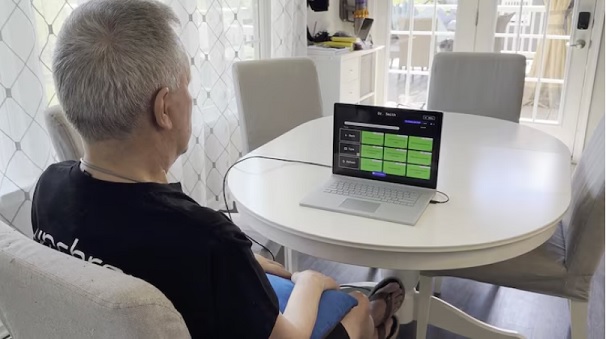
An American man with amyotrophic lateral sclerosis (ALS) has become the first patient in the world to use an Apple Vision Pro via an implantable brain-computer interface (BCI).
This means the patient, a 64-year-old man named Mark from western Pennsylvania, is able to use the device using his thoughts rather than using hand or voice commands. Mark is not giving his last name to preserve his privacy.
Mark doesn't have the use of hands but has been able to play Solitaire, bring up screens to watch movies and TV shows and even send text messages.
He said the implant has given him back some of his independence that he had started to lose as his ALS progressed.
"I lived alone for quite a long time, so I was used to doing all everything for myself and, when you lose that ability, I'm not gonna lie, it's been a challenge to not be able to do things for myself," Mark told ABC News. "I can see down the road … of endless possibilities."
'A punch in the gut'
In 2020, Mark started realizing that he couldn't pinch together the thumb and forefinger of his left hand. He originally believed he was beginning to develop a condition like carpal tunnel until he dropped a cup of coffee and decided it was time to visit a doctor.
An orthopedic doctor he was seeing for separate lower back issues suspected he might be experiencing a pinched nerve in his neck and a surgery was planned to fuse four vertebrae together, but the doctor recommended Mark see a neurologist first.
Mark had an appointment in January 2021 and through a series of tests, confirmed he had ALS.
"Unfortunately, that was kind of a punch in the gut," he said. "Unfortunately, with this disease, it's 100% fatal but mine fortunately is a little bit slower progression."
Mark said the paralysis has since climbed up his left arm, across his shoulders and down his right arm, and he's since also begun to experience some weakness in his neck.
How BCIs work
A BCI is a sensor that is implanted and translates brain signals into an action outside of the body.
There are different types of BCIs. Neuralink -- developed by Neuralink Corp., founded by Elon Musk -- is a small chip inserted directly into the brain tissue and requires brain surgery.
The BCI developed by the company Synchron involves a device implanted into one of the veins within the brain and is a minimally invasive procedure.
BCIs are designed to be used by people who struggle with neurological disabilities, such as a brain or spinal cord injury, or a degenerative disease like ALS.
"BCI research really started back in the '90s, so this isn't a new idea," Dr. Leah Croll, a neurologist at Maimonides Hospital, in Brooklyn, New York, told ABC News. "But in the last five years or so, technology has just evolved at such a rapid pace, in large part thanks to AI, and so now we're seeing this explosion of BCI research and applications like we never have before."
Recently, Synchron announced that it was able to connect its BCI to the Apple Vision Pro, the virtual reality headset. The sensor translates the brain signals, which, in turn, allows the patient to control the headset hands-free.
"It allows them to have some independence and some agency in choosing an immersive experience for themselves," Croll said.
A representative for Apple did not immediately return ABC News' request for comment.

